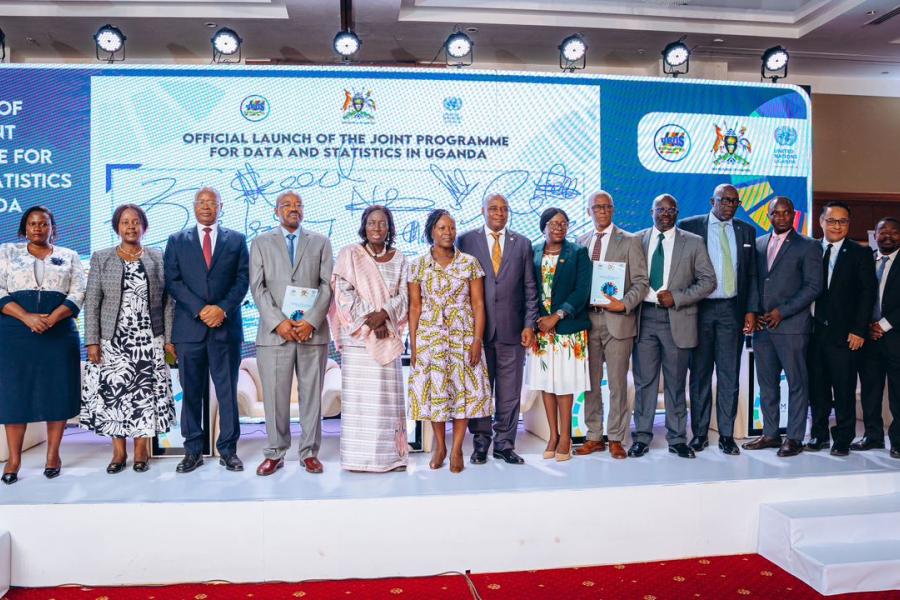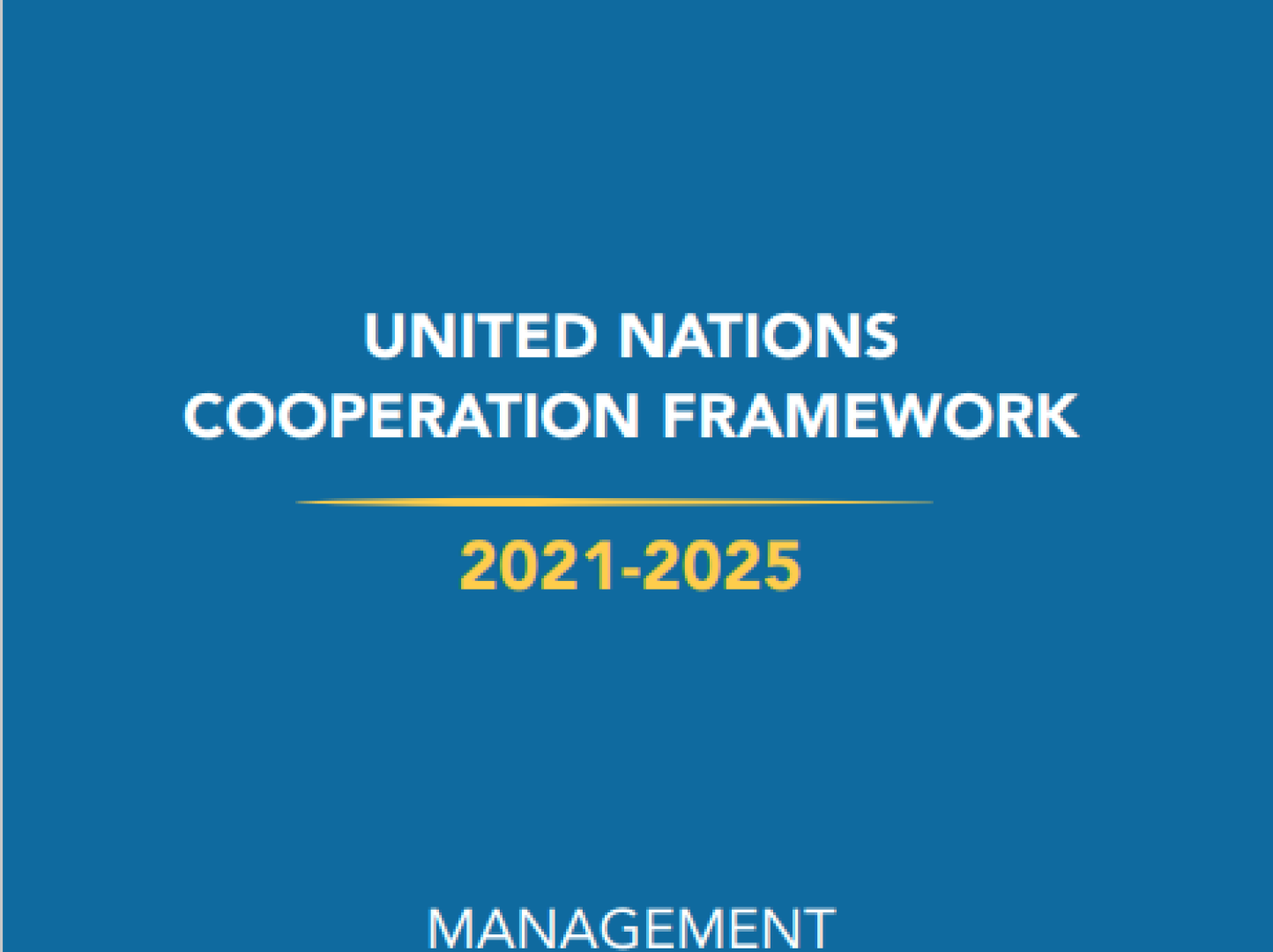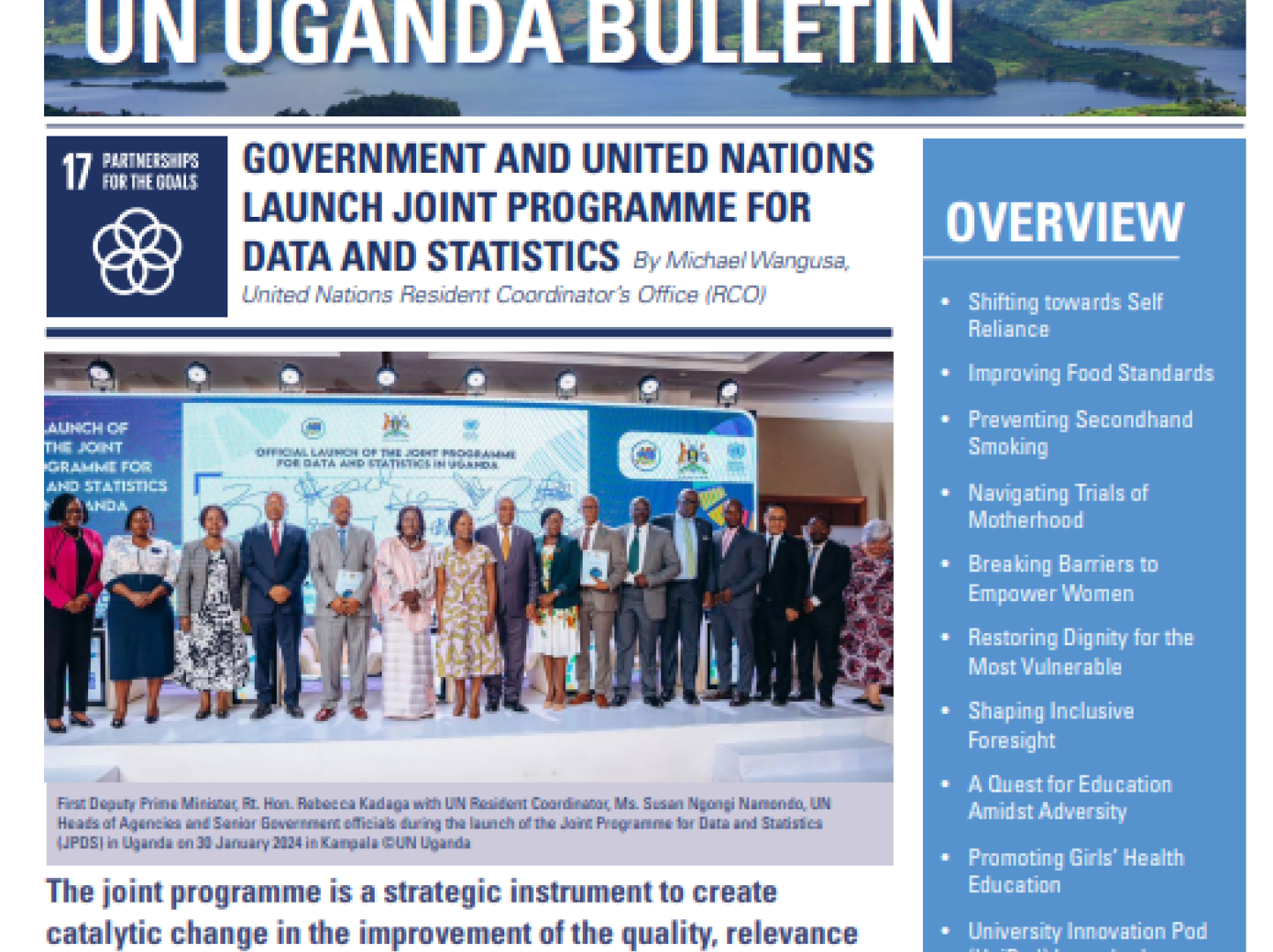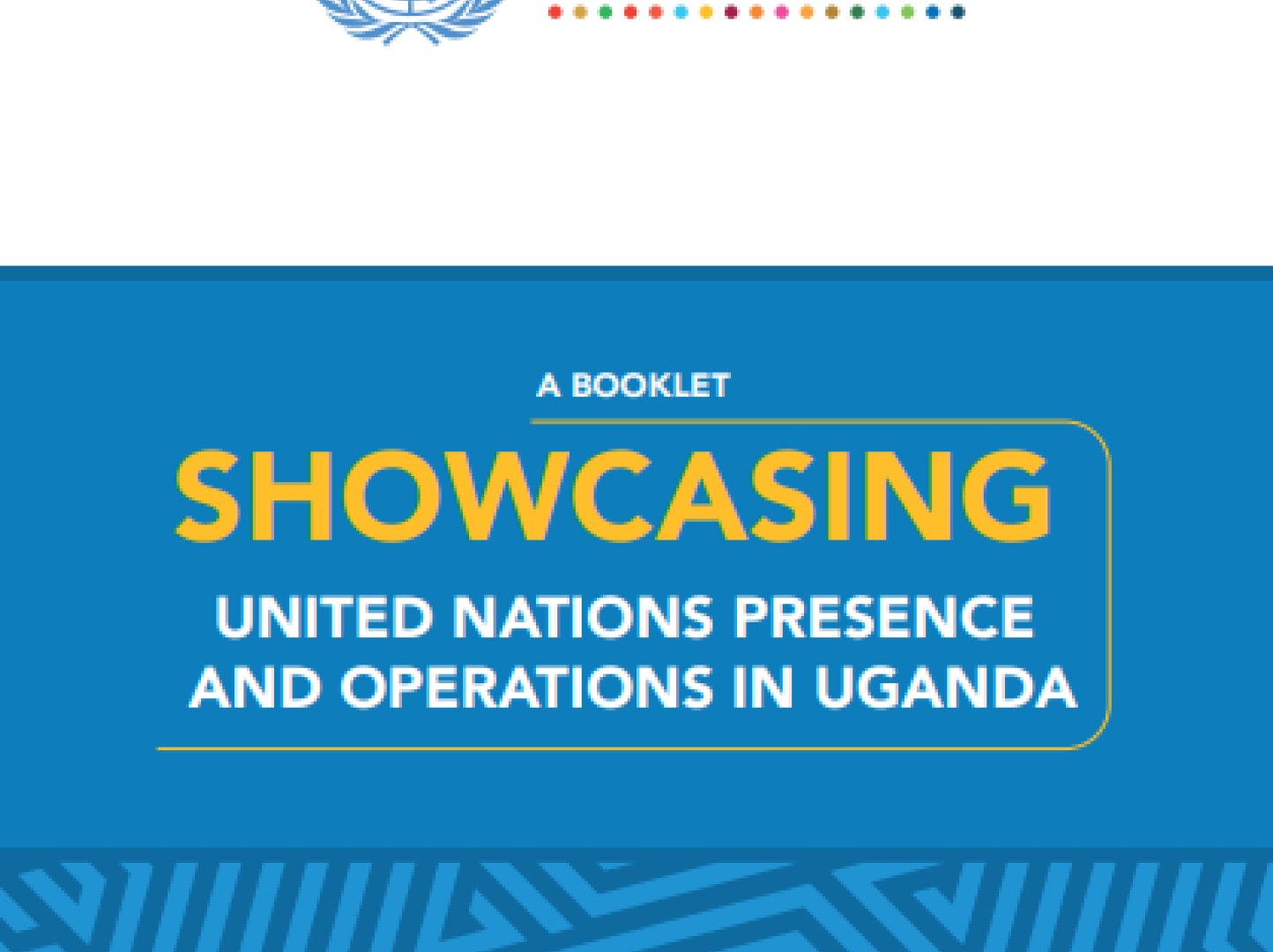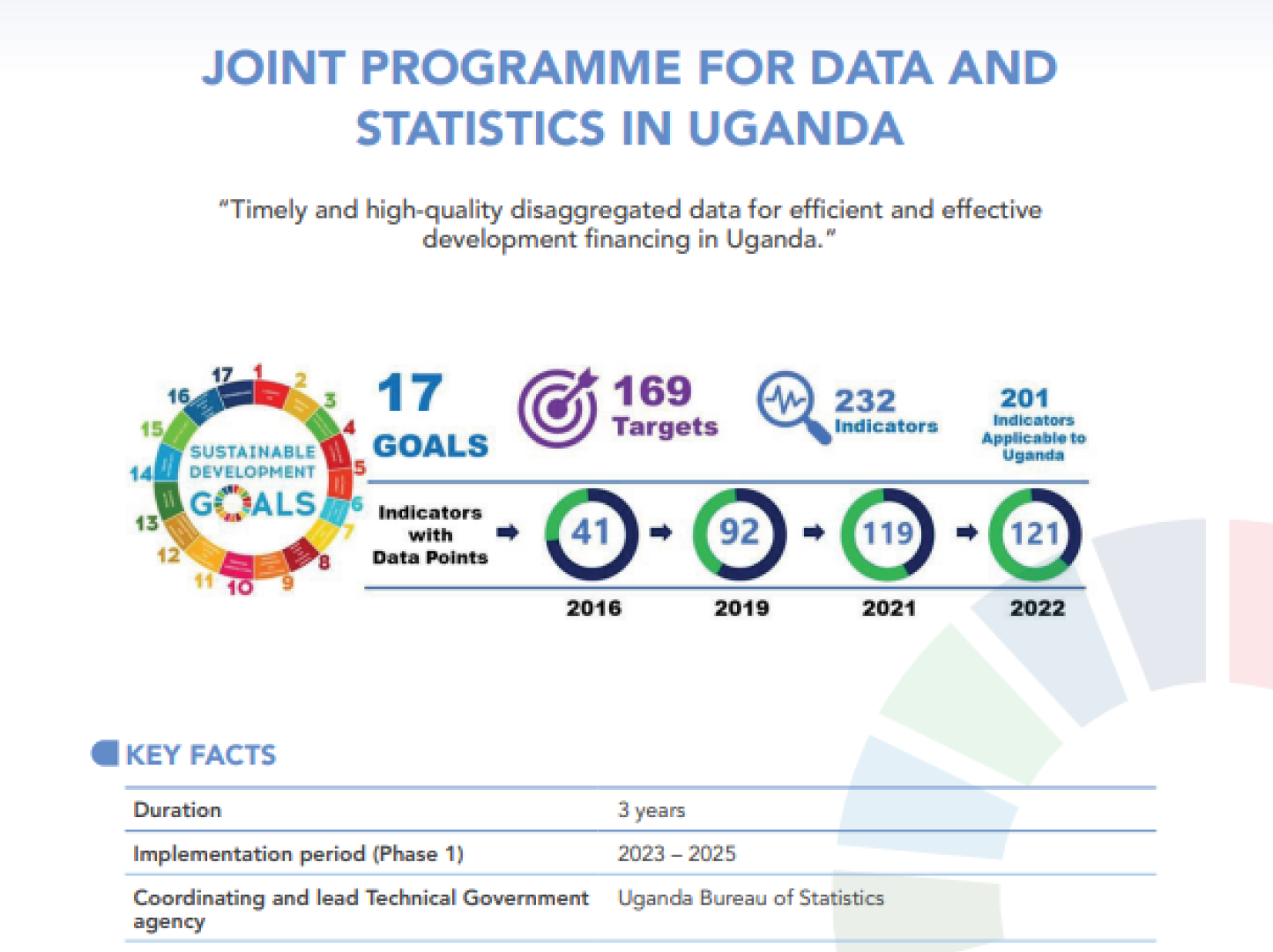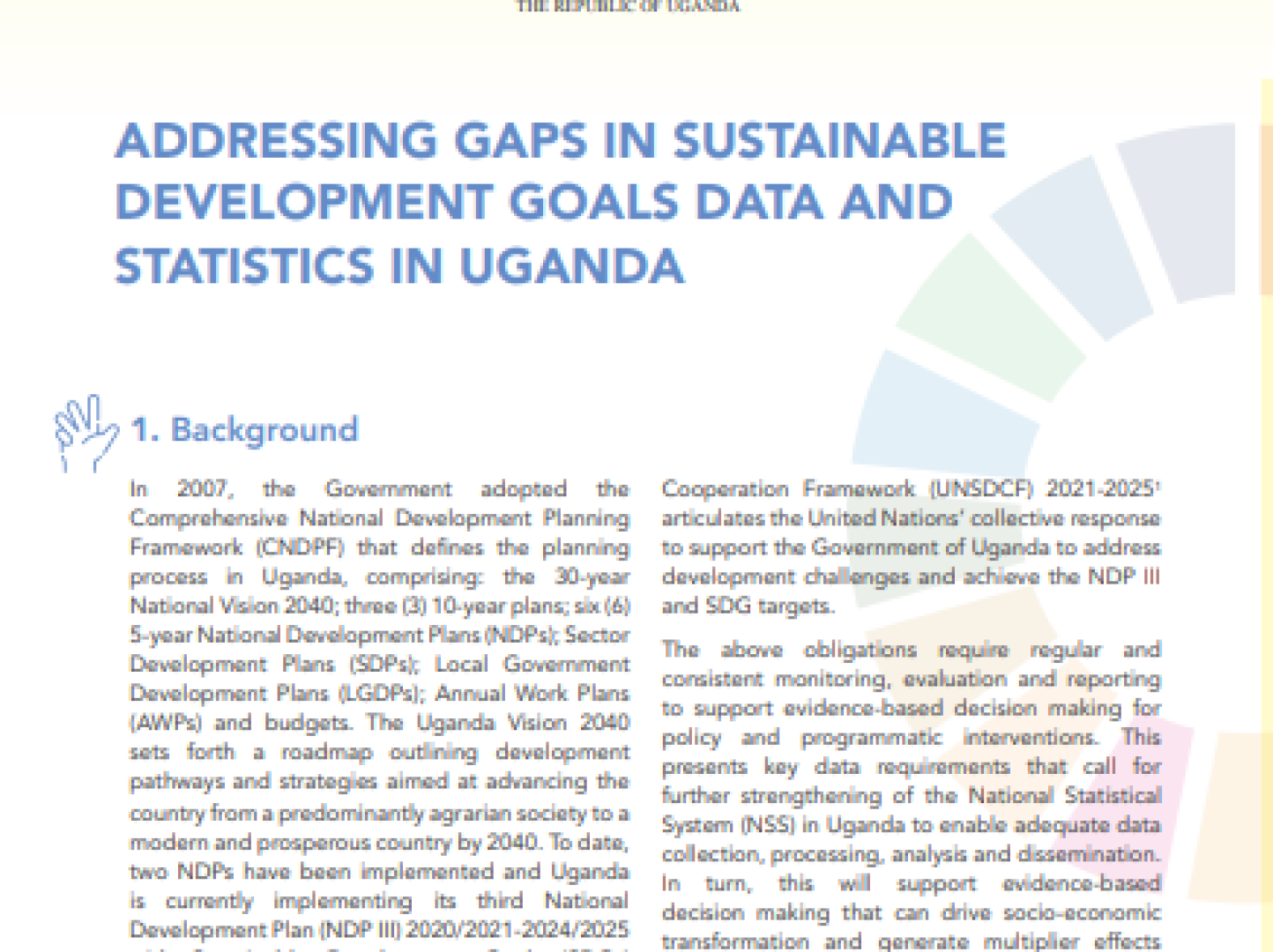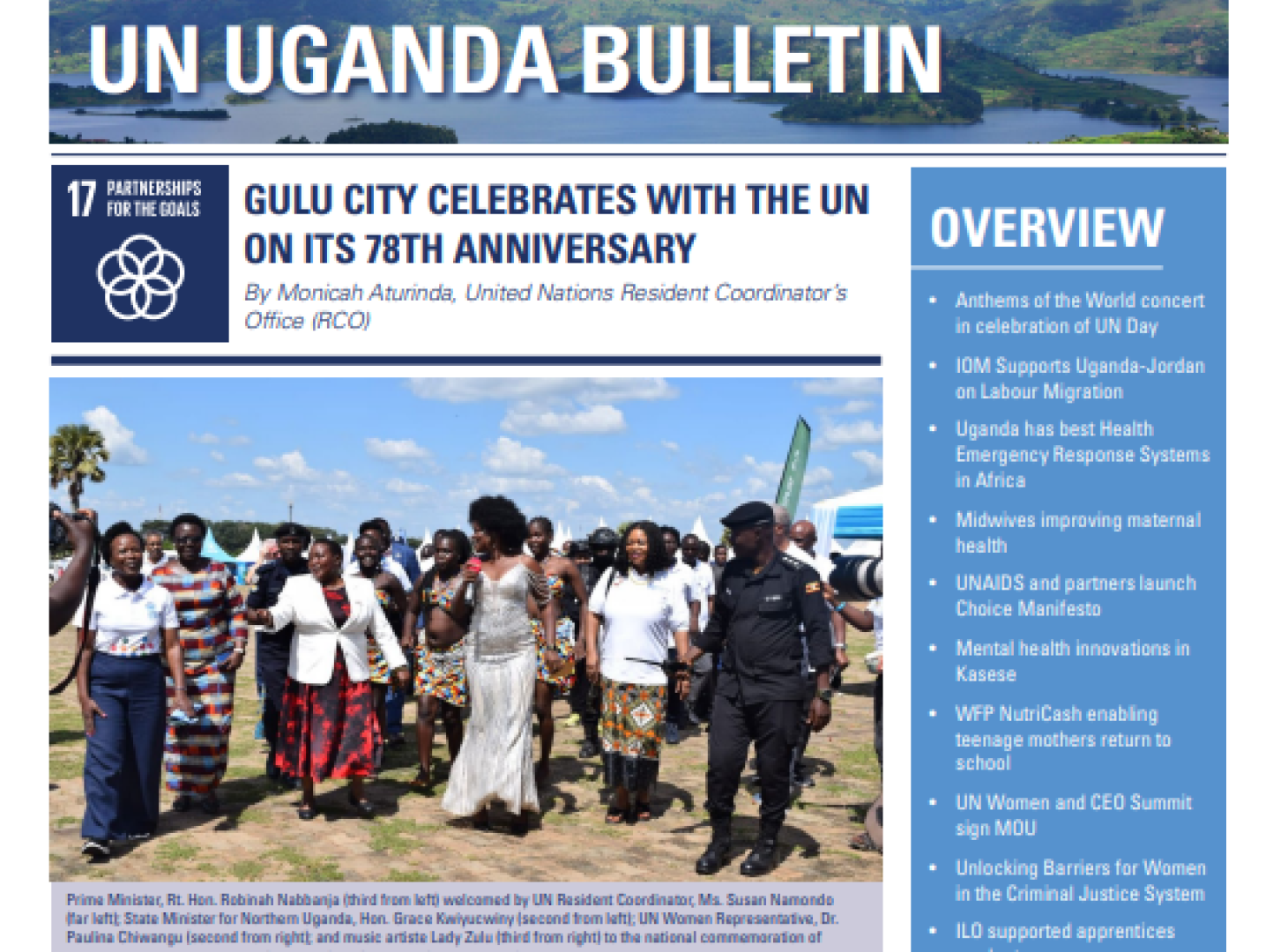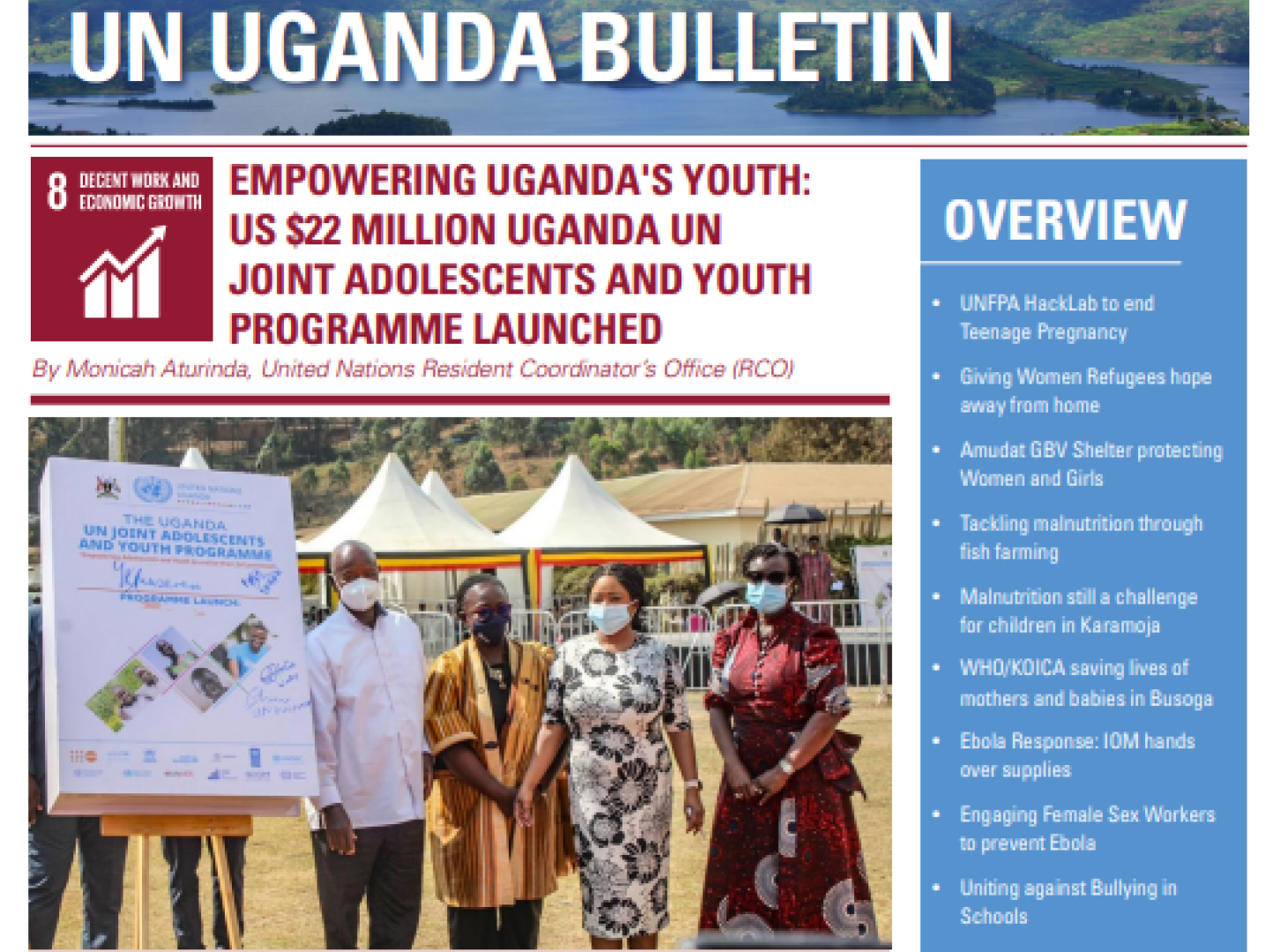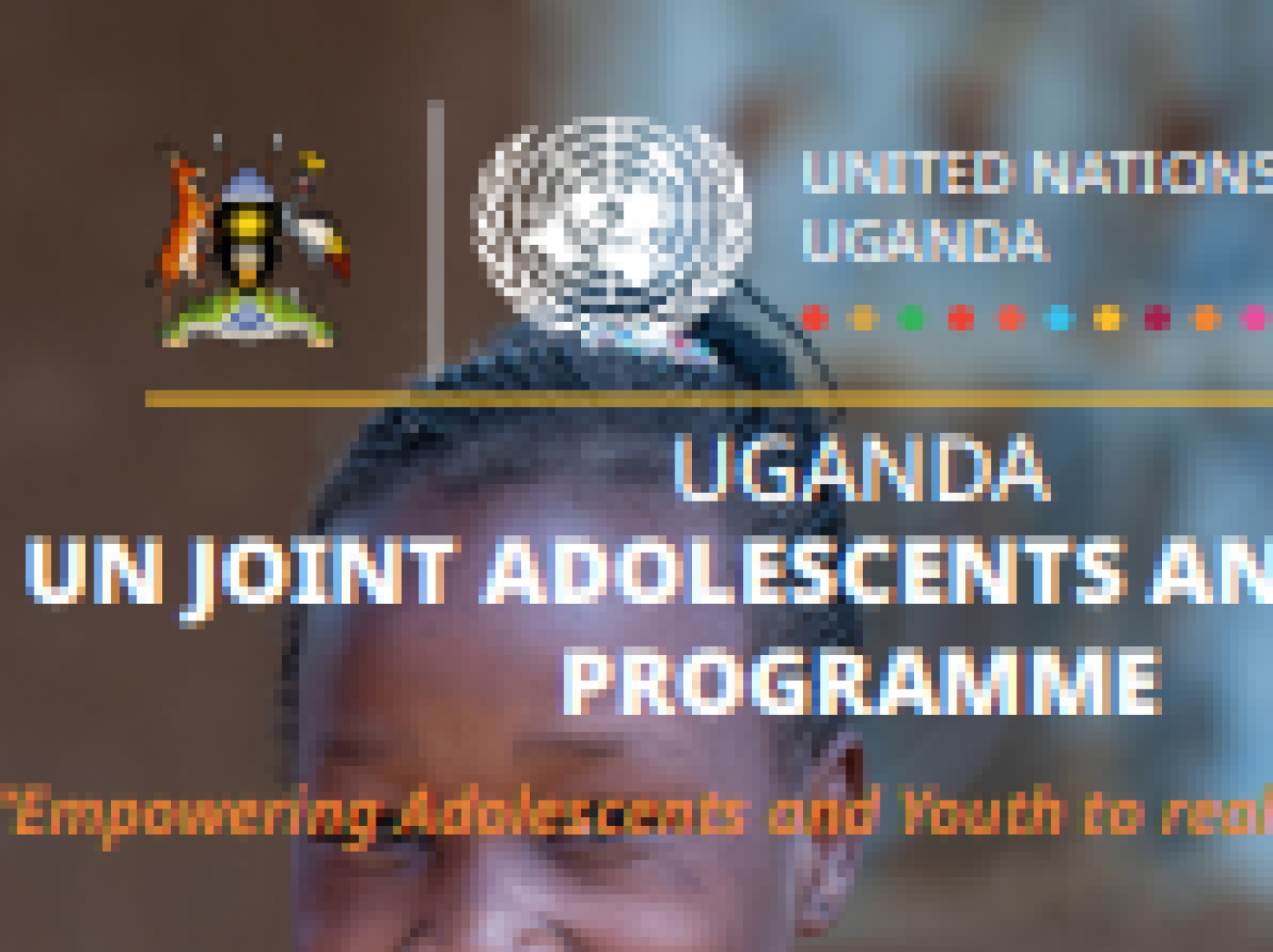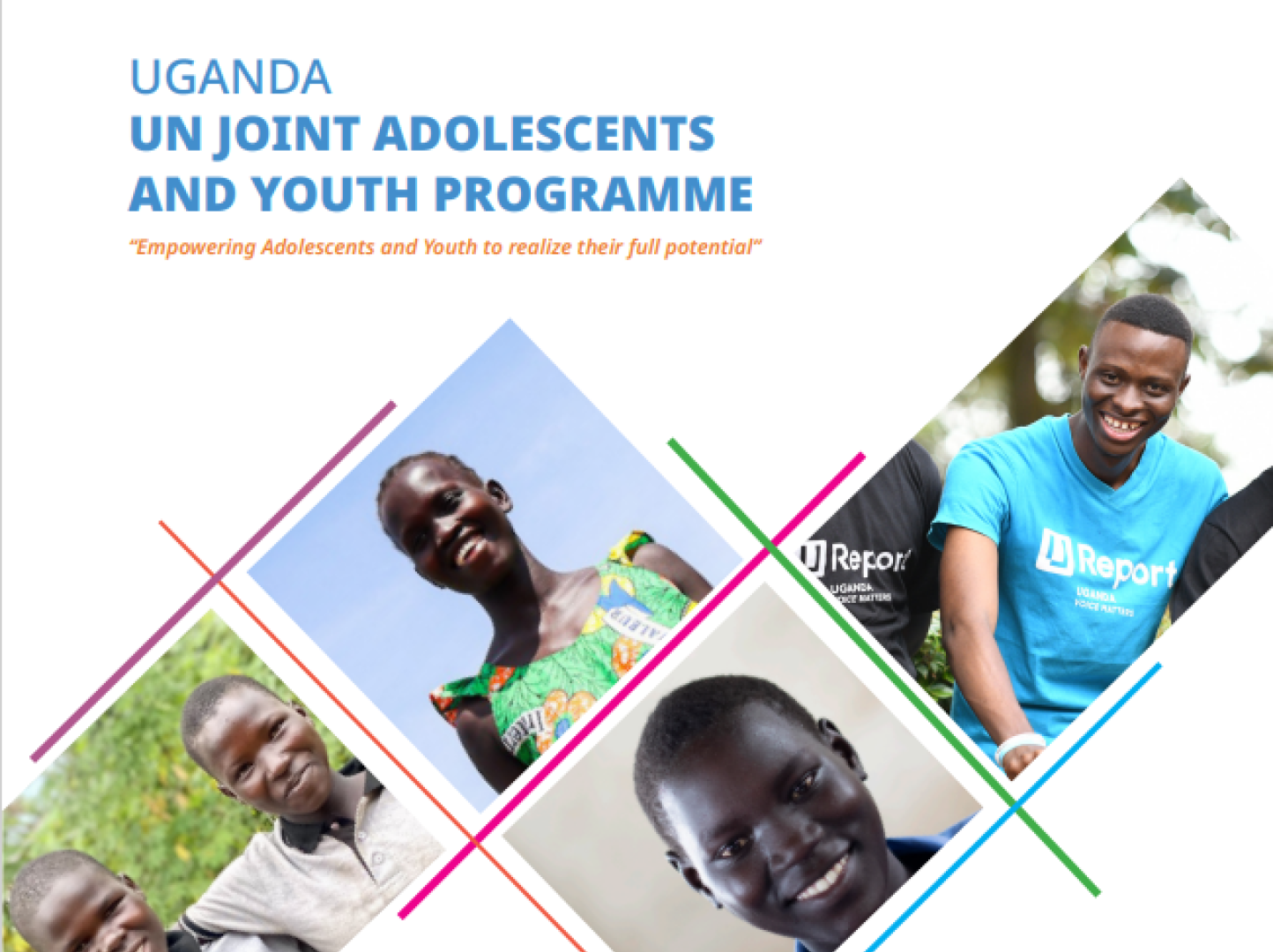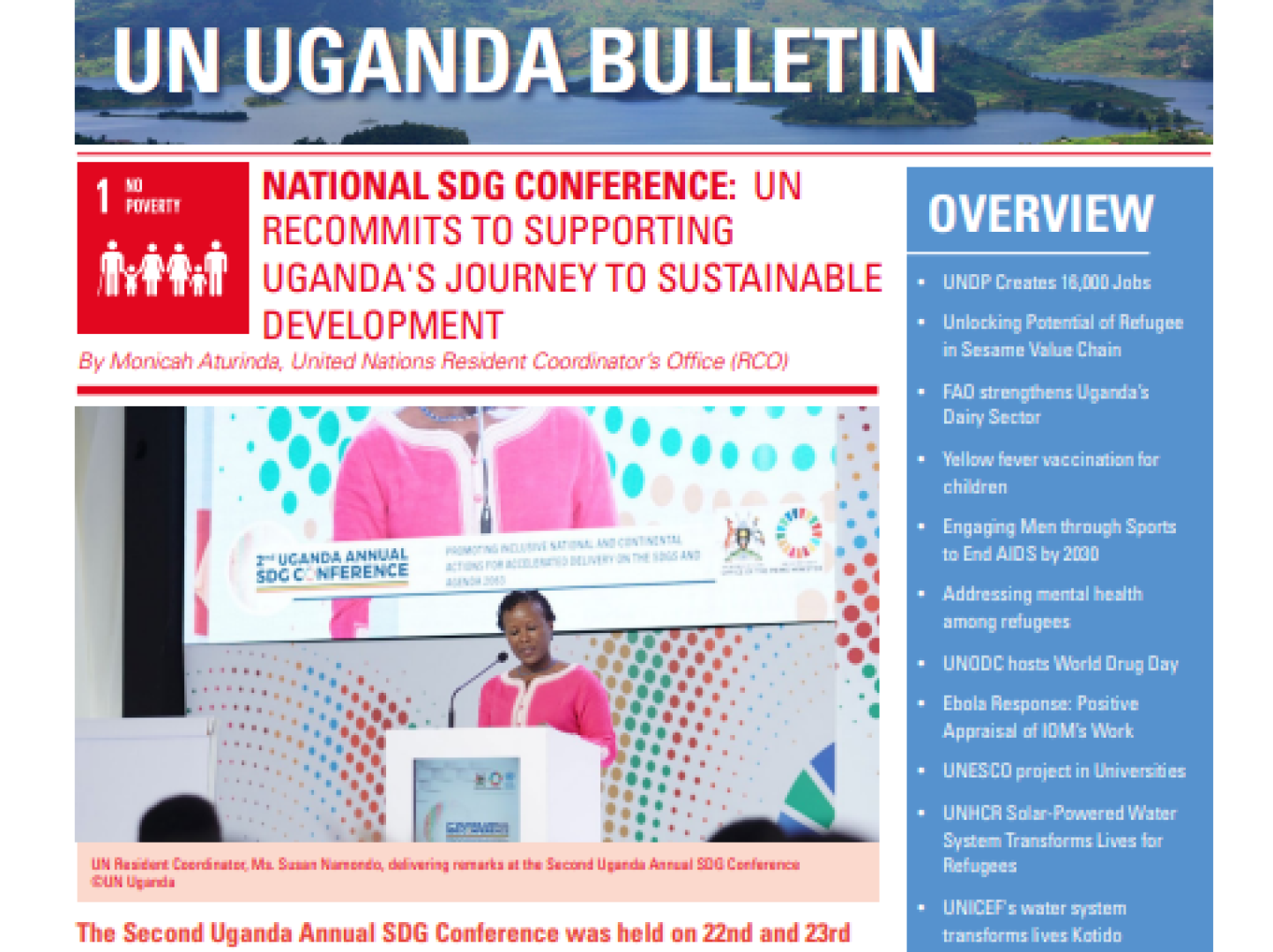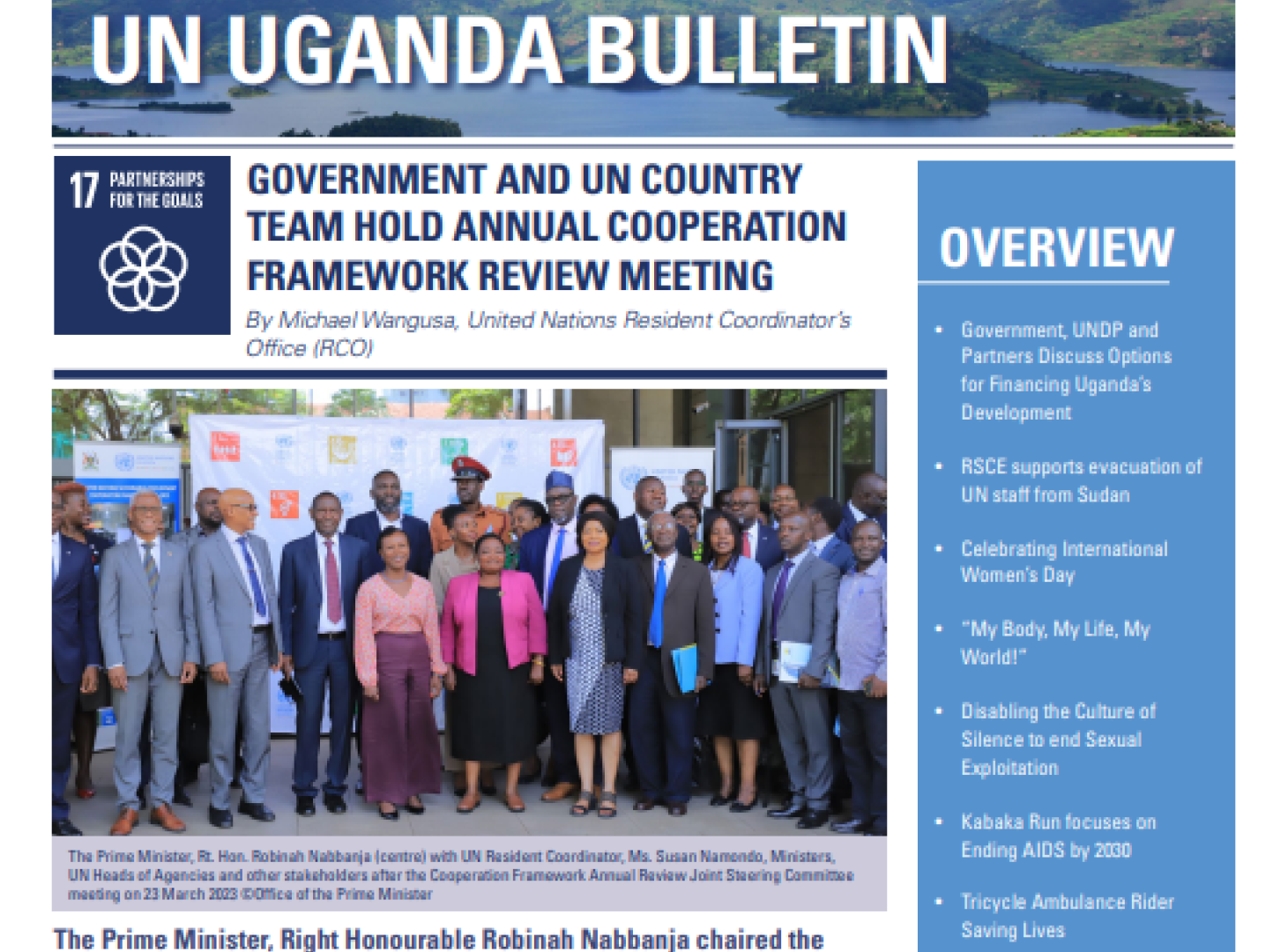Latest
Speech
25 April 2024
Remarks at the National Orientation Workshop for the Uganda UN Joint Adolescents and Youth Programme
Learn more
Speech
16 April 2024
Statement at Press Conference on Japan's contribution of US$ 4.3 million to support efforts towards refugees and host communities, and Karamoja response
Learn more
Speech
26 March 2024
Remarks at Dialogue and Sensitization of the Top Leadership of the Uganda Police Force
Learn more
Latest
The Sustainable Development Goals in Uganda
The Sustainable Development Goals are a global call to action to end poverty, protect the earth’s environment and climate, and ensure that people everywhere can enjoy peace and prosperity. These are the goals the UN is working on in Uganda:
Take Action
22 October 2020
Join the Conversation. Be the Change.
To mark its 75th anniversary, the United Nations is launching a global conversation on the role of international cooperation in building the future we want.
1 of 3
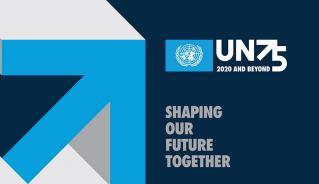
Story
11 October 2020
UN Resident Coordinator gives hope to child abuse survivors
The UN Resident Coordinator in Uganda, Rosa Malango has given hope to dozens of victims of defilement and forced marriages in Amudat, southern Karamoja.
She encouraged the survivors to overcome traditional beliefs and culture by embracing education and ensuring they complete school and become future leaders. Malango said there were opportunities for the survivors to make a turnaround and take charge of their own future by staying in school and attaining higher levels of education.
She cited an example of her own education challenges in a society that viewed women as incapable of leading but she eluded all the traditions to become a family head as well as a clan head, apart from her international responsibility as the UN Resident Coordinator in Uganda, an international structure.
This was during an impromptu stop to the rescue centre at Alakas Girls Primary School in Amudat town council on Tuesday. Malango is currently in Karamoja on an official visit to monitor the various projects implemented by UN agencies in Karamoja.
At Alakas Girls Primary School currently turned into a children’s rescue centre, 26 girls have been rescued from early marriage following alerts from social workers and probation office of the district who have collaborated to rescue victims of child marriage from the community.
The girls are given psychosocial support and counselling before they are integrated into the formal education system while those who have never been to school are given skills such as hairdressing and tailoring.
Frida Amuron, the Amudat community based development officer said that there were a lot of unreported cases across the district notably in rural areas where information about the rights of a girl child was still scanty. She said all 26 girls were rescued during the recent COVID-19 lockdown after the closure of schools.
She encouraged partners to scale up sensitization of communities coupled with punitive punishment under the law.
The Amudat Chief Administrative Officer, Wasswa Masokoyi noted that strong cultural norms such as adoration for bride price has made a section of the Pokot to view girls as a source of wealth. He asked UN agencies to collaborate with the probation office, police and other government structures to mobilize the community against child abuse and support girl child education.
According to the UBOS report, Amudat has 26.1 percent enrollment which is one of the least in the country. The district has projected 33,000 school-going age children of whom an estimated 8,885 were in school before COVID-19 pandemic. Local authorities have attributed the low enrollment and low literacy levels of 5 percent to traditional views about the girl child.
******
This article was published online by The Independent magazine of Uganda on 16 September 2020 based on report from Uganda Radio Network
1 of 3
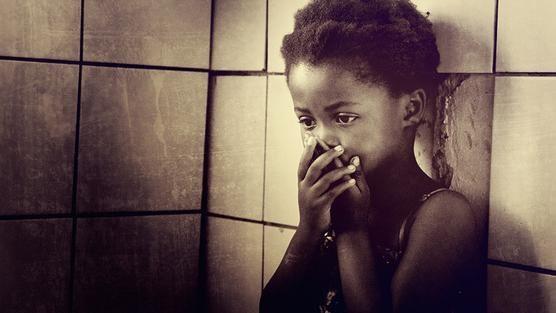
Press Release
06 October 2020
Prime Minister signs Joint Statement of the UN Sustainable Development Cooperation Framework (UNSDCF) 2021-2025
Kampala - The Prime Minister of Uganda, The Right. Honourable, Dr. Ruhakana Rugunda, signed the Joint Statement of the UN Sustainable Development Cooperation Framework (UNSDCF) 2021-2025.
The UN Resident Coordinator in Uganda, H.E. Ms. Rosa Malango signed on behalf of the United Nations System in Uganda, while the Chairperson of the National Planning Authority (NPA), Prof. Pamela Mbabazi signed on behalf of NPA.
Guided by the United Nations Uganda’s vision of contributing to a transformed inclusive Ugandan Society where people have improved quality of Life and Resilience for Sustainable Development, and building on the successes of the United Nations Development Assistance Framework (UNDAF) 2016-2020, the UNSDCF2021-2025 aims to support the Government to accelerate development and social transformation across Uganda as outlined in Vision 2040 and the third National Development Plan (NDPIII).
“The signing of this cooperation framework is another welcome demonstration of the mutually beneficial relationship between the UN system in Uganda and the Government and people of Uganda,” Prime Minister Dr Ruhakana Rugunda said. “We deeply value the role and contribution made by the UN system in promoting the development agenda of Uganda. We are committed to ensuring that this partnership grows from strength to strength” he added.
UN General Assembly Resolution 72/279 on the repositioning of the UN Development System, positions the United Nations Sustainable Development Cooperation Framework as the single most important UN country planning instrument in support of the 2030 Agenda. The Joint Statement stipulates the Cooperation Framework accountability featuring the UN entities that will support the UNSDCF implementation, the UN Country Team configuration and key highlights of UN entities’ contributions to the UNSDCF.
The UNSDCF accountability and signing levels include: 1) The Joint Statement at ministerial and UN Country Team level signed by the Right Honourable Prime Minister, Chairperson of the National Planning Authority (NPA), UN Resident Coordinator and UN entities and, 2) The Cooperation Framework at State level signed by His Excellency the President on behalf of the
Republic of Uganda and the UN Secretary-General’s Representative – by the UN Resident Coordinator. These will be followed by the formulation of the annualized Joint Work Plans aligned to the Program Implementation Plans of NDPIII.
Prof. Pamela Mbabazi highlighted the synergies expected between NDP III and the UNSDCF noting that, “the two planning documents bring our work in line and therefore the synchronized start of their implementation will enhance synergies and coordination, transparency and efficiency in the delivery of the both government and UN activities”
“I would also like to commend the UN system for adopting a whole-of-UN-system approach to jointly supporting the Government of Uganda towards meeting NDPIII and SDGs targets. The effort and consideration put into ensuring that all the 31 UN agencies promote coherence and mutual accountability cannot go un-recognized. The motivation of delivering as one to achieve common results is also at the heart of the programming principles of the NDPIII,” she added.
“Today we are witnessing a critical milestone in the new partnership between the United Nations and the Government and people of Uganda. The Cooperation Framework reinforces the mutual accountability between the UN and the host Government by creating space for the Joint Statement of accountability at Ministerial and UN Country Team level which today will be signed by the Right Honourable Prime Minister, the Chairperson of the National Planning Authority (NPA), UN Resident Coordinator and UN entities. The Joint Statement provides information on the capabilities and contributions of UN entities as well as the UN Country Team configuration,” said Ms. Malango.
“I wish to re-affirm the UN’s commitment to working with all stakeholders in supporting the Government towards the achievement of NDP III and SDG targets, and promotion of regional integration, peace and security, by addressing Africa Union Agenda 2063 and East African Vision 2050,” said Ms. Malango.
1 of 3
Story
02 April 2024
Government and United Nations Launch Joint Programme for Data and Statistics
Government and the United Nations System in Uganda have launched the Joint Programme for Data and Statistics (JPDS) in Uganda on 30 January 2024 in Kampala. The US$ 41,898,295 joint programme implemented by the Uganda Bureau of Statistics (UBOS) and 12 UN entities in Uganda is anchored on Uganda’s third National Development Plan (NDP III) 2020/2021 - 2024/2025, the United Nations Sustainable Development Cooperation Framework (UNSDCF) 2021-2025 and the Third Plan for National Statistical Development (PNSD III) 2020/21-2024/25.The joint programme is a strategic instrument to create catalytic change in the improvement of the quality, relevance and use of SDG data and statistics in Uganda consistent with international human rights and gender equality norms and principles. The joint programme aims at improving the capacity of the National Statistical System to produce, disseminate and use data and statistics.While launching the joint programme, First Deputy Prime Minister, Rt. Hon. Rebecca Kadaga speaking on behalf of the Prime Minister noted that, “as a country, we are at that critical take-off stage where we must continuously and simultaneously plan ahead, reflect on progress and weigh the options on the best way forward towards sustainable social and economic development across all sectors.”State Minister of Finance, Planning and Economic Development, Hon. Amos Lugolobi said, “I am confident that this initiative will revolutionize our National Statistical System to tap into mainstreaming administrative and citizen generated data into the realm of official statistics."While the Chairperson of the Board of UBOS, Dr. Albert Byamugisha observed that “the joint programme will greatly enhance the Development of the National Statistical System (NSS) and make the Bureau’s mandate more achievable by bringing all stakeholders on board.” In his remarks Executive Director of UBOS, Dr. Chris Mukiza noted that, “the joint programme was conceived mainly to close several gaps that have persistently affected Uganda’s data ecosystem despite all the progressive initiative over the years including lack of baseline information for some SDG indicators, slow pace of producing data series from administrative sources, limited technical skills for compilation of new SDG indicators and harnessing data from non-traditional sources; inadequate financial resources to procure requisite equipment for data collection and analysis and inadequate human resources.”UN Resident Coordinator in Uganda, Susan Namondo called “the launch a celebration of a new approach. Several UN agencies were supporting the Government on data and statistics, but this was in a fragmented way, so a lot of synergies remained untapped. The new approach would augment the good work already happening." Twelve (12) United Nations (UN) agencies have partnered with the Uganda Bureau of Statistics (UBOS) to develop a Joint Programme for Data and Statistics in Uganda are the following: United Nations Development Programme (UNDP), the United Nations Entity for Gender Entity and the Empowerment of Women (UN Women), the United Nations Children’s Fund (UNICEF), the United Nations Population Fund (UNFPA), the World Health Organisation (WHO), the United Nations Capital Development Fund (UNCDF), the International Labour Organisation (ILO), the Food and Agricultural Organisation (FAO), the United Nations Environment Programme (UNEP), the Joint United Nations Programme on HIV/AIDS (UNAIDS), the International Office of Migration (IOM) and United Nations Global Pulse (UNGP).The launch was attended by representatives from Government, Development Partners, civil society, faith and cultural leaders, the private sector, academia and research institutions and the media. During the launch the findings of the status review of data and statistics in Uganda were disseminated. Technical experts during the panel discussion re-affirmed the critical role of data and statistics in tracking and accelerating progress on SDGs in Uganda. They also highlighted the need to consolidate existing and build new partnerships in the implementation of the Joint Programme for Data and Statistics in Uganda. The launch drew commitment from partners to support implementation of the joint programme for data and statistics in Uganda.
1 of 5
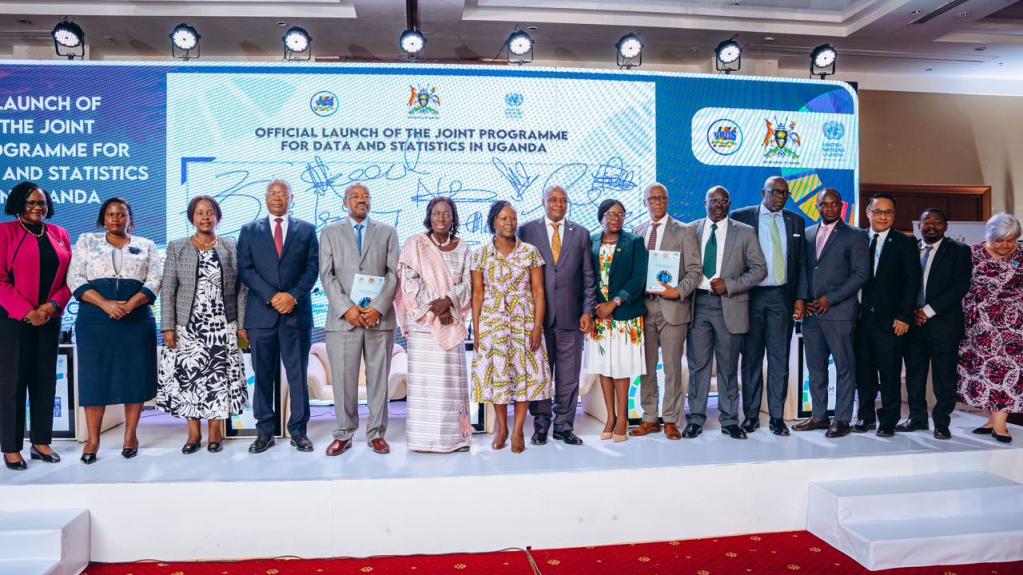
Story
21 November 2023
Cash-based Transfers Changing Lives of Refugees in Nakivale Refugee Settlement
Irene Nduusi is a widow and refugee living in Nakivale Refugee Settlement. She lost her husband during the war in the Democratic Republic of Congo (DRC). Together with her five children, Irene arrived in Uganda in March 2020. For the first years in the refugee settlement, Irene and her family depended solely on food distributed by the World Food Programme. She had no alternative source of income to supplement the monthly food rations.
“We used to receive food from WFP, but occasionally, it could not take me through to the next cycle of food distribution. I needed some income to supplement it as well as meet my family’s other basic needs,” Irene explains.
Irene’s life changed when WFP introduced cash transfers in Nakivale Refugee Settlement. She moved from in-kind food to cash assistance. She later joined the Family savings group and saved part of her money with the group for six months.
“I received my share at the time of sharing and bought the first sewing machine,” Irene explains.
Through the Family savings group, Irene has had two training courses from WFP in financial literacy, which has enabled her to improve her finances in terms of savings, borrowing and investment.
“After the financial literacy training, I realized that I could borrow money from the savings group and pay it back in instalments. I borrowed money to purchase a second sewing machine. The Family savings group gave me the third machine after visiting me and found many women were in need training, but the machines were not enough,” she says.
Irene currently has three sewing machines and teaches women and girls in her neighbourhood how to do tailoring. She said, “I realized many women and girls did not have jobs, I started teaching them tailoring but at a small pay.”
At family level, Irene can afford to provide a balanced diet to her five children, pay their school fees as well as meet some of their basic needs.
With funding from the European Civil Protection and Humanitarian Aid Operations (ECHO) and UK Foreign, Commonwealth and Development Office (FCDO), WFP scaled up the cash-based transfer modality in all the 13 refugee settlements in Uganda. Over US$ 4 million is distributed in cash-based transfers (CBT) to over 800,00 beneficiaries monthly in Uganda.
1 of 5
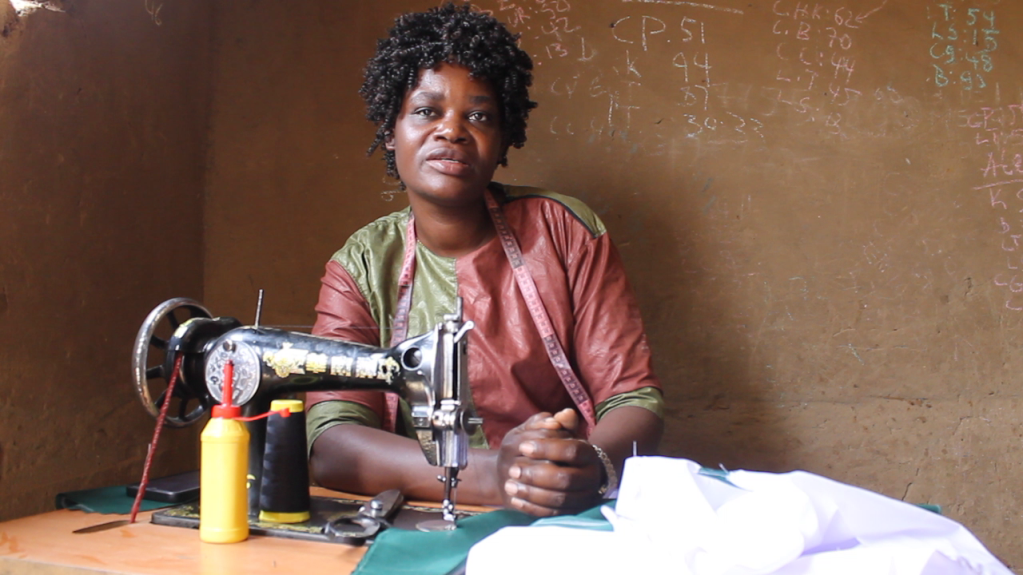
Story
09 September 2023
People’s SDGs Festival thrills Kampala
The fun filled Kampala People’s Sustainable Development Goals (SDGs) Festival 2023 under the theme "Harnessing Citizens' Potential: Fostering Ownership, Expression, Enjoyment, and Innovation for SDGs" was held on 10 and 11 August 2023.
The festival was organised by the SDG Secretariat at the Office of the Prime Minister in partnership with the Uganda National NGO Forum, UN Resident Coordinator’s Office and Kampala City Council Authority (KCCA) with funding from the Royal Danish Embassy. The event was graced by the participation of the Minister of General Duties responsible for SDGs, Rt. Hon. Justine Kasule Lumumba; UN Resident Coordinator, Ms. Susan Namondo; Ambassador of Denmark to Uganda, H.E. Ms. Signe Winding Albjerg; Executive Director, Uganda National NGO Forum, Dr. Moses Isooba; Executive Director, KCCA, Ms. Dorothy Kisaka.
The festival began with a marching procession with the police band from Kololo Ceremonial Grounds to KCCA Grounds in Lugogo. Led by the skaters, the aim of the procession which marched a distance of three kilometres, was to raise awareness about the SDGs.
The festival presented Kampala residents with the opportunity to learn more about the SDGs and to contribute views on how to accelerate the achievement of the SDGs. The festival was also a lead-up activity to the SDGs Summit, which will be held ahead of the UN General Assembly in New York in September. The summit will be attended by World Leaders will focus on reviewing progress made towards the achievement of the SDGs at the halfway point.
The Agenda 2030 and the SDGs are a blueprint for a better world, where poverty is eradicated, inequalities are diminished, and environmental sustainability is safeguarded. The SDGs are incorporated in the commitments of Uganda’s third National Development Plan (NDPIII). Achieving these ambitious goals cannot rest solely on the shoulders of governments, and partners institutions. It is the collective effort by everyone that holds the key to unlocking the true power of the SDGs. A critical step in achieving this is through raising awareness about the SDGs, and that is why the Kampala SDGs Festival was particularly important.
In her remarks UN Resident Coordinator, Ms. Susan Namondo noted that, “while the Government has various initiatives supporting job creation and livelihoods especially for the youth, including the Parish Development Model (PDM), the Youth Livelihood programmes and ‘Emyooga’, more efforts and innovations are needed to overcome the challenges. The lack of access to decent jobs is a global problem, and therefore solutions proposed by young people in Uganda can contribute to global solutions.”
During the festival members of the public of all walks of life showed cased innovations and shared views through public dialogues aimed at accelerating the achievement of the SDGs. The public dialogues conversations continued simultaneously online #TondekaMabega #Act Now #GlobalGoals.
The festival had interludes during with variety of entertainment was presented to the public including cultural music and dance, poetry and contemporary music. Leading music artists who performed included Pallaso and Butcherman, Ghetto President.
The festival aimed at fostering ownership of the SDGs within the community to inculcate the notion that everyone has a role to play in making a positive impact, regardless of gender or age. So that citizens would commit themselves to promoting sustainable practices in their daily lives, supporting local initiatives, and holding each other accountable on the collective agenda. Everyone’s efforts are needed to see the change we want.
The views obtained through the dialogues at the SDGs festivals in Mbarara, Mubende, Jinja, Lira and Kampala; the online discussions and other consultative processes including the Second Annual National SDGs Conference contributed to formulation of Uganda’s commitment paper and rescue plan that will be presented at the SDG Summit New York in September. The commitment will be actualized through future high impact initiatives under auspices of the Government National development plans and programmes.
The SDG festivals will continue to harness citizens' potential for the SDGs. Collaboration and partnership are key. All stakeholders in the country need to join hands and combine efforts to successfully accelerate the achievement of the SDGs.
1 of 5

Story
01 August 2023
National SDG Conference: UN Recommits to Supporting Uganda's Journey to Sustainable Development
The organisation of the conference was coordinated by the Office of the Prime Minister through the SDG Secretariat and the UN Resident Coordinator’s Office.
The conference was opened by the Vice President of Uganda, H.E. Jessica Alupo representing the President and was attended by the Prime Minister Rt. Hon. Robinah Nabbanja, Minister for General Duties responsible for SDGs Rt. Hon. Justine Kasule Lumumba, Ministers, Members of Parliaments, Heads of the Government Department and Agencies. UN participants included the UN Resident Coordinator, Ms. Susan Namondo, UN Heads of Agencies and representatives. Other participants were Development Partners, Religious Leaders, representatives from Civil Society and the Private Sector, and academia. In her remarks Rt. Hon. Nabbanja noted that “due to the significant milestone of the first National SDG Conference, the Cabinet passed a directive that SDG Conference is organised annually as a platform where all stakeholders will continuously reflect on SDG progress, identify and showcase catalytic innovations as well as make policy recommendations for accelerating SDG implementation and achievement.”
In her remarks, the UN Resident Coordinator noted that “the timing of this conference could not have been more opportune. It coincides with the upcoming SDGs Summit, slated for September 18-19, 2023, as part of the United Nations General Assembly. This global gathering will witness Heads of State and Government conducting a comprehensive review of the SDGs' progress at the midway point of their implementation. The aim is to provide high-level political guidance for transformative actions, ensuring the realization of the 2030 targets.”
She emphasized the crucial need for accelerated efforts to achieve the SDGs in light of the varied progress and the uncertainties that lay ahead. She highlighted the significance of public sector effectiveness, the power of decentralization, and the vital role of the private sector as a key partner in development. Additionally, she highlighted the importance of financing, harnessing the data dividend, and renewing efforts to protect the environment. While presenting the key messages and outcomes at the end of the conference, the Minister responsible for SDGs, Rt. Hon. Lumumba noted that “The Parish Development Model has emerged as a promising strategy for reducing vulnerability and driving inclusiveness at the local level and development partners have a vital role to play in supporting the localization of the SDGs in Uganda and effective partnerships between the government, civil society, and development partners are essential for mobilizing resources, sharing expertise, and aligning efforts towards the SDGs”
"The outcomes of this conference will be shared with the Cabinet for information and guidance. They will also be shared at the upcoming SDGs High Level Political Forum in July 2023 and the SDG Summit in September 2023 under the auspices of the United Nations General Assembly,” said Rt. Hon. Lumumba.
1 of 5
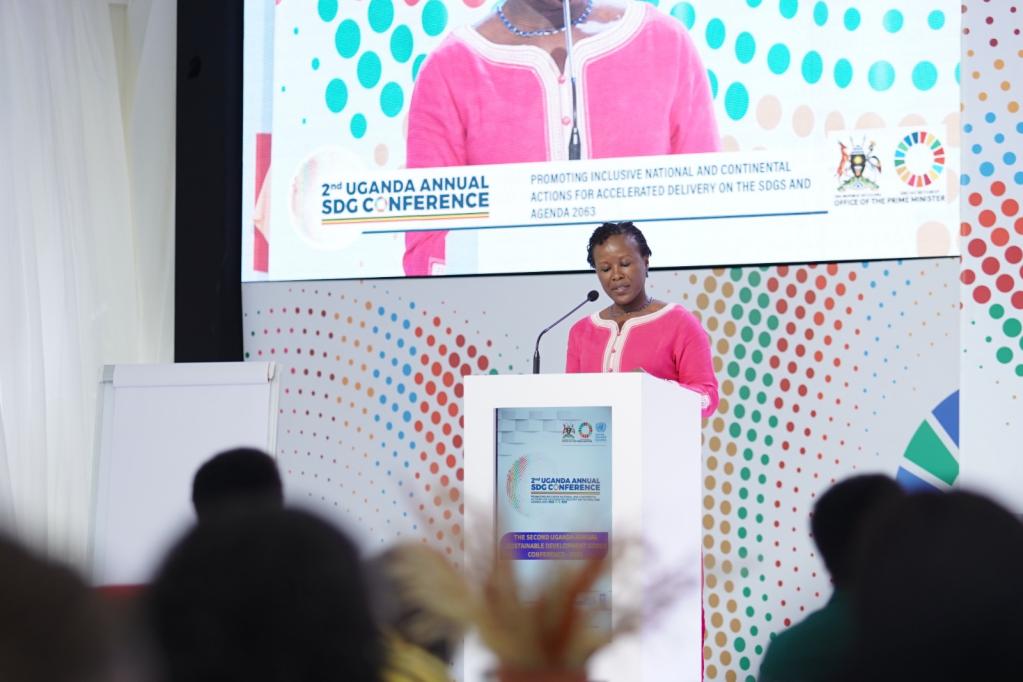
Story
15 March 2023
Government and UN Recommit to end Female Genital Mutilation
“With eight years remaining in this decade of action, there is potential to eliminate this harmful practice through sustainable partnerships with men and boys” said Ms. Susan Namondo, UN Resident Coordinator in Uganda at the commemoration of the International Day of zero tolerance to Female Genital Mutilation 2023 in Kampala.
Ms. Namondo added that men and boys’ voices and actions can positively change the deeply rooted social and gender norms, to create a safe space for girls and women to realize their rights and potential regarding health, education, income, and equality.”
Although the prevalence of female genital mutilation in Uganda is already declining (from 1.4 per cent in 2011 to 0.3 per cent, according to UDHS 2016), progress needs to increase tenfold to meet the global target of elimination by 2030.
“We must act quickly, decisively and on many fronts simultaneously,” said Ms. Namondo.
Hon. Peace Mutuuzo, Minister of State for Gender and Culture at the Ministry of Gender, Labour and Social development in Uganda, the chief guest at the event reechoed Ms. Namondo’s message, asking men to partner with the government to end such harmful practices that have negative impacted our women and girls.
“The effects of FGM affect even those that have not been mutilated. Ending FGM is a job we must not delegate to others,” said Hon. Mutuuzo.
She urged all stakeholders to support the government to establish local radio station in the most affected communities in the eastern part of Uganda so that focused messages on FGM broadcast to the communities.
In Uganda, the commemoration of the International Day of Zero Tolerance of Female Genital Mutilation has been held since 2003 and this year (2023) marks the 10th year of commemorating the International Day following the UN Resolution.
“The UN continues to be a trusted partner in efforts geared towards eliminating female genital mutilation and is committed to work with the government to eliminate this harmful practice,” said Ms. Namondo.
Since 2008, UNFPA, jointly with UNICEF, have led the largest global programme to accelerate the abandonment of female genital mutilation in 17 countries globally. In Uganda, UNFPA and UNICEF have leveraged funding from the Spotlight Initiative and UN Trust Fund for COVID-19 response to expand the services to women and girls affected by female genital mutilation.
Speaking to some of the achievements, Ms. Namondo said: “The UN family together with the Government of Uganda have expanded services for FGM prevention, protection and care for women and girls in the most affected communities in Karamoja region,”.
She added that over 35,000 community members have actively participated in making public declarations on FGM abandonment which represents a positive shift in deeply rooted social norms driving the practice of FGM.
The Spotlight Initiative and UN Trust Fund for COVID-19 response are Joint UN initiatives that brings together different UN agencies and are both managed by the Resident Coordinator’s Office. These have registered tremendous success in the different parts of Uganda, a testament that the UN family can achieve a lot through joint programmes and funds.
The Spotlight Initiative is a global, multi-year partnership between the European Union and the United Nations to eliminate all forms of violence against women and girls. In Africa, the Spotlight Initiative aims to eliminate sexual and gender-based violence, including harmful practices, and it is currently scaling up existing initiatives on FGM and child marriage across the region. In Uganda, the Initiative is a multi-stakeholder programme implemented by eight UN agencies (UN Women, UNICEF, UNFPA, UNDP, UNHCR, IOM and Pulse Lab) and entities, more than 20 government ministries, departments and agencies, six district local governments, and over 30 civil society organizations, the private sector, religious and cultural institutions, and academia in Uganda. It is being implemented in 7 districts of Uganda including Amudat, Arua, Kampala, Kasese, Kitgum, Kyegewa and Tororo.
Eliminating Female Genital Mutilation is a critical step towards realizing the Sustainable Development Goals (SDGs) particularly SDGs 3 on Good Health and Well-being, 4 on Quality Education, 5 on Gender Equality and 10 on Reduced Inequalities.
1 of 5
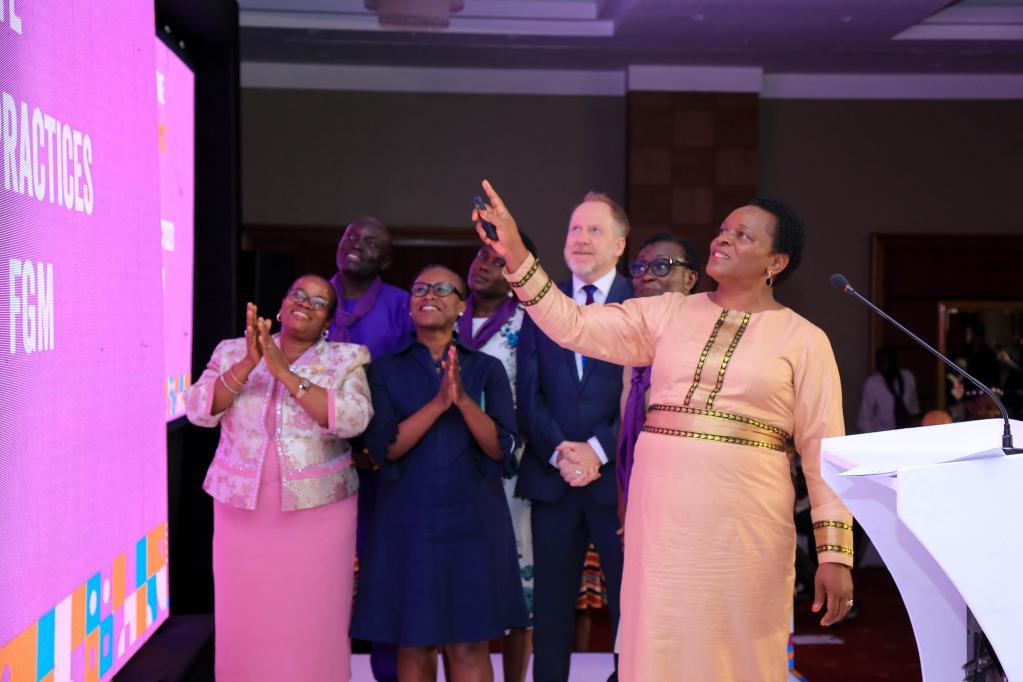
Press Release
31 January 2024
United Nations Agencies and Uganda Bureau of Statistics (UBOS) Launch US$ 41M Joint Programme for Data and Statistics
Kampala, 30 January 2024, Government and the United Nations System in Uganda have launched the Joint Programme for Data and Statistics (JPDS) in Uganda. The US$ 41,898,295 joint programme implemented by the Uganda Bureau of Statistics (UBOS) and 12 UN entities in Uganda is anchored on Uganda’s third National Development Plan (NDP III) 2020/2021 - 2024/2025, the United Nations Sustainable Development Cooperation Framework (UNSDCF) 2021-2025 and the Third Plan for National Statistical Development (PNSD III) 2020/21-2024/25,
The joint programme is a strategic instrument to create catalytic change in the improvement of the quality, relevance and use of SDG data and statistics in Uganda consistent with international human rights and gender equality norms and principles. The joint programme aims at improving the capacity of the National Statistical System to produce, disseminate and use data and statistics.
While launching the joint programme, First Deputy Prime Minister, Rt. Hon. Rebecca Kadaga speaking on behalf of the Prime Minister noted that, “as a country, we are at that critical take-off stage where we must continuously and simultaneously plan ahead, reflect on progress and weigh the options on the best way forward towards sustainable social and economic development across all sectors.”
State Minister of Finance, Planning and Economic Development, Hon. Amos Lugolobi said, “I am confident that this initiative will revolutionize our National Statistical System to tap into mainstreaming administrative and citizen generated data into the realm of official statistics.”
While the Chairperson of the Board of UBOS, Dr. Albert Byamugisha observed that “the joint programme will greatly enhance the Development of the National Statistical System (NSS) and make the Bureau’s mandate more achievable by bringing all stakeholders on board.”
In his remarks Executive Director of UBOS, Dr. Chris Mukiza noted that, “the joint programme was conceived mainly to close several gaps that have persistently affected Uganda’s data ecosystem despite all the progressive initiative over the years including lack of baseline information for some SDG indicators, slow pace of producing data series from administrative sources, limited technical skills for compilation of new SDG indicators and harnessing data from non-traditional sources; inadequate financial resources to procure requisite equipment for data collection and analysis and inadequate human resources.”
UN Resident Coordinator in Uganda, Susan Namondo called “the launch a celebration of a new approach. Several UN agencies were supporting the Government on data and statistics, but this was in a fragmented way, so a lot of synergies remained untapped. The new approach would augment the good work already happening."
Twelve (12) United Nations (UN) agencies have partnered with the Uganda Bureau of Statistics (UBOS) to develop a Joint Programme for Data and Statistics in Uganda are the following: United Nations Development Programme (UNDP), the United Nations Entity for Gender Entity and the Empowerment of Women (UN Women), the United Nations Children’s Fund (UNICEF), the United Nations Population Fund (UNFPA), the World Health Organisation (WHO), the United Nations Capital Development Fund (UNCDF), the International Labour Organisation (ILO), the Food and Agricultural Organisation (FAO), the United Nations Environment Programme (UNEP), the Joint United Nations Programme on HIV/AIDS (UNAIDS), the International Office of Migration (IOM) and United Nations Global Pulse (UNGP).
The launch was attended by representatives from Government, Development Partners, civil society, faith and cultural leaders, the private sector, academia and research institutions and the media. During the launch the findings of the status review of data and statistics in Uganda were disseminated. Technical experts during the panel discussion re-affirmed the critical role of data and statistics in tracking and accelerating progress on SDGs in Uganda. They also highlighted the need to consolidate existing and build new partnerships in the implementation of the Joint Programme for Data and Statistics in Uganda. The launch drew commitment from partners to support implementation of the joint programme for data and statistics in Uganda.
FOR INQUIRIES AND INFORMATION CONTACT
Mr. Didacus Okoth
Senior Public Relations Officer
Tel +256 755342128 / 773342128
UGANDA BUREAU OF STATISTICS
Statistics House, Plot 9 Colville Street
P.O Box 7186 Kampala, Uganda
TEL: 0414706000, FAX: +256414237553
EMAIL: ubos@ubos.org, WEBSITE: www.ubos.org
Or
Mr. Michael Wangusa
Communication Officer
Tel. +256 771005 988
UN RESIDENT COORDINATORS OFFICE
WFP Building Plot 17-19 Clement Hill Road
EMAIL: UNRC.Uganda@un.org WEBSITE: uganda.un.org
1 of 5
Press Release
21 November 2023
Outcome Statement of the National Partnership Forum for the Government of Uganda and its Development Partners
1. The National Partnership Forum (NPF), convened by the Government of Uganda and its development partners, concluded its deliberations on matters of mutual interest consistent with the Vision 2040 aspirations implemented through the National Development Plans, National Partnership Policy, Sustainable Development Goals (SDGs) and the Global Partnership for Effective Development Principles (GPEDC). The NPF reaffirmed its commitment to work together for sustainable development in Uganda.
2. The NPF had two main sessions. The first session focused on Government priorities, the Parish Development Model (PDM) – as an accelerator programme and guidelines as well as principles for development assistance that are aimed at creating an enabling environment for mutual accountability and achieving effective results. These guidelines underscore the importance of development cooperation principles both for the Government and development partners working in tandem to ensure we achieve the desired results.
3. Recognizing the invaluable contributions of Development Partners in various sectors of Uganda's development as indicated in the last paper by the LDPG, we acknowledge the significance of Official Development Assistance (ODA) to Uganda. However, we stressed the need to explore opportunities to strengthen our economy and establish a sound revenue base to sustain our nation's development goals.
4. The NPF is an integral part of the National Partnership Dialogue Framework, which operationalizes the National Partnership Policy. Going forward, we recommit to ensuring that all organs of the NPF continue to meet and discuss issues of mutual interest. To further uphold our partnership principles, we have agreed to establish a Joint Accountability and Results Framework, which will be instrumental in cultivating a culture of mutual accountability.
5. This NPF is seen as a launching pad for further engagements to address even the most challenging issues. We commend the remarkable efforts of the Prime Minister, all government agencies, and the Local Development Partners Group for their dedicated work in making this event a success.
6. As we move forward, all partners in the NPF remain resolute in their determination to collaborate, build strong relationships, and work collectively to achieve the development goals set out in Uganda's Vision 2040 and National Development Plans. We look forward to the continued growth of our partnership and are confident that together, we can overcome any challenges that lie ahead.
1 of 5
Press Release
18 August 2023
United Nations Joint Statement on International Youth Day 2023
The International Youth Day 2023 is marked by the national theme: “Accelerating Recovery from COVID-19 and full implementation of the 2030 agenda; the role of youth”, where the Ministry of Gender, Labour and Social Development, the United Nations (UN) agencies and partners have come together to celebrate youth contributions to national development and to highlight issues related to youth and their wellbeing, their ambitions and aspirations that remain unmet.
Uganda’s significant youth population, comprising 76% under 30 years old, holds immense potential for development. Proper investments in education, health, and protection can harness this potential, while neglect can leave them vulnerable, impacting their well-being. Uganda's adolescents and youth already face Sexual and Reproductive Health and Rights (SRHR) challenges, which worsened during the COVID-19 pandemic that led to disrupted education, interruptions in access to SRHR services and information, increased poverty, food insecurity, exposure to violence, abuse and exploitation.
It is crucial to capitalize on the potential of young Ugandans and to involve them in national and subnational planning and policy development from a demographic dividend, human rights and results based perspectives for the nation's COVID-19 recovery. Their unique experiences, views and ideas can contribute to the national and international development goals.
Spanning from 6 August, the Youth Week has been a vibrant celebration in Uganda in observance of the International Youth Day. Notably, the Ministry of Gender, Labour and Social Development, the National Youth Council and 13 UN agencies (FAO, ILO, IOM, UNAIDS, UNCDF, UNDP, UNESCO, UNFPA, UNHCR, UNICEF, UNODC, UN Women and WHO) will be launching the UN Adolescent and Youth Joint Programme on 18 August, when the momentous commemoration ceremony is held.
The Programme, broadly aligned to the Global UN Youth Strategy and the national frameworks and policies, aims to address the barriers hindering youth potential. The focus areas are: sexual and reproductive health, inclusive quality education, skills and employment opportunities, climate action, and peace and security. With an approximate value of 22 million USD, the Programme covers 8 districts across 4 regions of Uganda for the 2023-2025 period, which is the first phase with roll-out to other districts.
In her remarks at the commemoration of the International Youth Day, Dr. Mary Otieno, UNFPA Uganda Country Representative, while speaking on behalf of the UN System in Uganda, called for both vision and action for the youth, noting, “Youth are the resource and backbone on which the country must rely on to advance sustainable development and to generate innovative solutions that will help the country achieve its development goals and reap the demographic dividend.”
“Together, we can ensure that the 2030 agenda and Uganda’s vision 2040 promote the human rights, health and well-being of the largest generation of young people in history,” Dr. Mary Otieno concluded.
-Ends-
Notes to the Editor
Every Year on 12 August, Uganda joins the rest of the world to commemorate the International Youth Day (IYD) designated by the United Nations and is commemorated every year on 12 August 2023. The Day was proposed at the 1st World Conference of Ministers responsible for youth that took place in Lisbon-Portugal 8-12 August 1998 and approved in 1999 under Resolution 54/120 of the 54th UN General Assembly.
Uganda joins other Commonwealth countries to mark the Year of the Youth 2023, by supplementing the already existing youth programmes and will deliver on other interventions that are intended to support the youth towards COVID-19 recovery and attainment of the SDGs. Some of these programs include but are not limited to the following:-
▪ The UN Joint programme for Adolescents and Youth;
▪ A Coordination Mechanism for Youth Programmes with functional coordination structures at all levels;
▪ A National Action Plan for Youth, Peace and Security;
▪ A reviewed National Action Plan for Youth Policy;
▪ Take on mainstreaming of youth issues into Whole of Government approach;
▪ Professionalization of Youth Work for better service delivery to the young people;
▪ Support the implementation of the Parish Development Model; and
▪ Produce an annual report on the Status of Youth in Uganda.
It is believed that Uganda can harness the demographic dividend offered by its youth population by recognizing youth as key stakeholders in the recovery process; by strengthening platforms for youth participation in decision-making processes; by investing and allocating resources to youth development activities; by having a cohort of professional youth workers to support the youth; and by collaborative efforts involving government, civil society, and international partners. Uganda can pave the way for sustainable development, social progress and a brighter future for its young generation.
For more information please contact; Michael Wangusa, Communication Officer, Office of the UN Resident Coordinator - Uganda via Email: michael.wangusa@un.org
1 of 5
Press Release
10 May 2022
Government and the United Nations meet to discuss UN Sustainable Development Cooperation Framework
The Joint Government - United Nations Steering Committee of the UN Sustainable Development Cooperation Framework in Uganda (2021-2025) met to discuss the implementation and the Results Report for 2021 of the UN Cooperation Framework.
The meeting took place on 5 May 2022, at the Office of the President Conference Hall in Kampala and was Chaired by the Right Hon. Robinnah Nabbanja, Prime Minister of the Republic of Uganda. The meeting was attended by government officials, donor community, international organizations, private sector, academia and civil society organisatons.
In her opening remarks, the Prime Minster thanked the United Nations team for the support, commitment and effort put into coordinating the implementation of the Cooperation Framework and urged government Ministries, Departments and Agencies to continue supporting this partnership.
The Cooperation Framework is implemented by the United Nations in collaboration with relevant Government Ministries, Departments and Agencies and has three strategic priorities; Transformative and Inclusive Governance; Shared Prosperity in a Healthy Environment and Human Well-Being and Resilience.
“As government, we remain committed to take any corrective measures necessary for the achievement of the UN Cooperation Framework objectives,” said the Prime Minster. She emphasized the need for timely reporting and accountability for both resources spent and tangible results from all projects and programmess supported.
The UN Sustainable Development Cooperation Framework is the most important instrument for planning and implementation of the UN development activities at country level in support of the implementation of the 2030 Agenda for Sustainable Development (2030 Agenda).
The UN Resident Coordinator, Ms. Susan Namondo appreciated the strong collaboration with the government of Uganda, the donor community, international organisations, private sector, academia and civil society organisatons for their support in achieving the outcomes of the Cooperation Framework and advancing, mainstreaming, localisation and financing of the Sustainable Development Goals (SDGs) and Agenda 2030.
Since the formulation of the Cooperation Framework, the context that we live in Uganda has significantly changed due to unforeseen development challenges notably the COVID-19 pandemic. This called for innovative ways of doing things. The meeting endorsed the following recommendations.
Increased investment for enhanced capacity to produce and use statistics at national and sub national levels
Support localization, mainstreaming and integration of SDG indicators and Voluntary National Review (VNR), Citizen Generated Data (CGD)
Strengthen mechanisms for implementation and monitoring of labour export policy and regulations to protect the rights of workers and employers
Increase investment for research and technology focusing on disaster and climate change mitigation, response, and management
In September 2020, President Yoweri Museveni launched the Cooperation Framework for Uganda. In line with UN Reform, the Cooperation Framework was formulated through a highly consultative process over several months from 2019 to 2020 involving representative from Government, United Nations and non-state actors, including the private sector, academia, religious and cultural institutions, civil society including women, youth, and organizations representing persons with disabilities.
1 of 5
Press Release
21 April 2021
Japan contributes US$ 9.8 million to support efforts towards refugees and host communities, border security as well as COVID-19 response in Uganda
KAMPALA, The Government of Japan in March committed approximately US$ 9.8 million to support refugees and host communities as well as border security, with a strong focus on mitigating the COVID-19 impacts, over a period of one year from April 2021 to March 2022.
The support has been channeled through the United Nations and International Organizations: the United Nations High Commissioner for Refugees (UNHCR), the United Nations Population Fund (UNFPA), the United Nations Entity for Gender Equality and the empowerment of Women (UN Women), the United Nations Children's Fund (UNICEF), the United Nations World Food Programme (WFP), the United Nations Development Programme (UNDP), the International Organization for Migration (IOM), and the International Food Policy Research Institute (IFPRI).
“Japan recognizes that the humanitarian situation in refugee-hosting areas is devastating, especially under the spread of the COVID-19. Therefore, the 2021’s contribution has been made with a specific focus on mitigating the impacts of the COVID-19 to the vulnerable population, including refugees, host community members, women and children in Uganda. Acknowledging Uganda’s generous progressive refugee policy and needs for humanitarian–development supports, the Government of Japan is determined to continue to support Uganda’s solidarity with refugees and host communities,” said Ambassador Fukuzawa.
Honourable Hilary Onek, Minister of Relief, Disaster Preparedness and Refugees, who attended the press conference said, “On behalf of the Government of Uganda I would like to take this opportunity to thank the Government of Japan through the Ambassador of Japan in Uganda for the generosity exhibited towards the refugee community.The Government of Uganda commends the Government of Japan for their tireless efforts and support to Uganda, indeed Japan will always remain a true partner to Uganda. I am here to emphasize to the world Uganda’s generosity despite the scarcity of resources and to retaliate Uganda’s open door policy. Uganda, as a country, holds a special place on the world stage when it comes to refugees. ”
Speaking on behalf of the UN system in Uganda, H.E. Rosa Malango, the UN Resident Coordinator, said, “I would like to applaud the government and people of Japan for this valuable contribution to the global efforts in the fight against the COVID-19 pandemic as well as to the advancement of the human security in Uganda.”
Present at the press conference were representatives of the involved UN agencies: Mr. Joel Boutroue (UNHCR Uganda Representative); Mr. Alain Sibenaler (UNFPA Uganda Representative); Dr. Munir Safieldin (UNICEF Uganda Representative); Ms. Sheila Ngatia (UNDP Uganda Deputy Resident Representative); Ms. Adekemi Ndieli (UN Women Uganda Deputy Country Representative); Mr. Robert Ackatia-Armah (WFP Uganda Head of Food Systems & Nutrition); Mr. Olivier Balagizi (IOM Uganda IBM Project Officer); and Mr. Jason Yauney (IFPRI Uganda, Country Representative).
The assistance has been provided to help meet the objectives the Global Compact on Refugees (GRC) through the implementation of the Comprehensive Refugee Response Framework (CRRF) in Uganda, a whole-of-society approach which, under the Government’s leadership, rallies support among a wide range of stakeholders including UN agencies, International Financial Institutions, development and humanitarian partners and the private sector to improve delivery of services for refugees and the communities hosting them.
Uganda is the largest refugee hosting country in Africa with more than 1.45 million refugees and asylum-seekers, including 83 percent women and children. Majority of the refugees and asylum seekers in Uganda originate from South Sudan, the Democratic Republic of Congo and Burundi. Uganda’s refugee laws and policies are among the most progressive in the world. Refugees and asylum seekers are entitled to work, have freedom of movement and can access social services.
UNHCR Has received US$2,500,000 towards the provision of minimum health care package in Bidibidi refugee settlement, protection services in several settlements in northern Uganda and promotion of livelihood opportunities for refugee and host communities through UNHCR-JICA cooperation on rice promotion in Rwamwanja, Rhino Camp and Adjumani settlements. The project is implemented within the context of the CRRF. The fund specifically supports the continuation and expansion of UNHCR-JICA cooperation on rice promotion and farming for refugees and their hosts; access to primary health care for over 232,000 refugee and host communities in Bidibidi as well as preparedness and response for outbreak of epidemics; community-based protection interventions to improve prevention and response to gender-based violence, child protection and mental health and psychosocial support.
UNFPA Has received US $1,515,918 to increase availability and utilization of integrated sexual reproductive health and rights (SRHR) and gender based violence (GBV) services among refugees and host communities in target refugee hosting districts in South-Western and Northern Uganda during the COVID-19 pandemic. UNFPA will support the strengthening of the functionality of Health Centers IVs in refugee hosting districts and support community demand creation to reduce maternal mortality among refugees and host communities. In addition, survivors of GBV will be provided with preventive prophylaxis, treatment and referrals for psychosocial support and information, and community mechanisms for early identification of SGBV victims, referral pathways and psychosocial support systems will be strengthened. The refugee response part of the project will be implemented in the refugee hosting districts of Isingiro, Kamwenge, Kyegegwa, Kikuube and Lamwo.
UN Women Has received US $ 1,154,817 to empower over 4,000 women and girl refugees and hosts (direct) and 8,000 (indirect) to mitigate the impact of multiple crises on their livelihoods, protect themselves from exposure to gender-based violence, and participate in decision-making processes within their communities in 3 refugee hosting districts of Adjumani, Yumbe and Terego. The proposed project builds on UN Women’s experience and achievement in promoting the resilience, self-reliance, leadership, and protection of refugee women achieved in the last four years in Uganda’s refugee hosting districts. Key strategies will involve support to women farmers to engage in Climate Smart Agriculture; women and youth increased access to second chance education livelihood initiatives; access to ICT facilities and equipment, digitalised Village Savings and Loan Associations and cash for work opportunities. Transformational leadership skills, legal aid, psychosocial support as well as positive gender norms will be promoted in support of women's leadership and protection from violence.
UNICEF Has received US$1,146,981 for emergency assistance for the prevention of further spread of COVID-19 Infection. With the funds received, UNICEF will play a key role in the COVID-19 health response, including risk communication action in 3 refugee hosting districts and the COVID-19 high-risk districts of Karamoja sub-region including: Isingiro, Kikuube, Kyegegwa, Abim, Amudat, Kaabong, Karenga, Napak, Nabilatuk, Nakapiripirit, Moroto and Kotido. In addition, UNICEF aims to improve the nutrition status of children and mothers in the districts of: Abim, Amudat, Kaabong, Karenga, Napak, Nabilatuk, Nakapiripirit, Moroto and Kotido. UNICEF will also undertake key WASH interventions in Kikuube and Kamwenge Districts. Finally, UNICEF will support emergency preparedness and response capacity building of Disaster Management committees in Koboko, Obongi, Kasese, Bundibugyo, Karenga, and Nakapiripirit districts.
WFP Has received US$1,000,000 to introduce a programme that will improve access to nutritious food among refugees and Ugandans in host communities. WFP will provide fresh-food vouchers to cover critical food needs of pregnant and nursing women and children aged 6-23 months while promoting social behavioural change. In addition, the organization will provide seed vouchers to promote the production of fast-maturing nutritious foods. WFP will stimulate demand for nutritious foods while causing households to produce and consume more high-value crops throughout the value chain.
UNDP Has received US$880,000 to support and mitigate the effects of COVID-19 on household food security and environmental restoration. This proposed project will bridge the Humanitarian-Development-Peace nexus by providing green livelihoods options for resilience-building for refugees and host communities with a focus on women and youth. This will include vocational skills-building, MSME development and access to finance, clean energy solutions to provide energy access to health facilities to selected refugee hosting districts, while providing peace education for peaceful co-existence between refugee and host communities.
IOM Has received US$ 375,000 to contribute to strengthening border management to mitigate risk of terrorism from land and maritime borders in the context of COVID-19 in Uganda. IOM is working with the Ministry of Internal Affairs through the Directorate of Citizenship and Immigration Control (DCIC), and other relevant partners, to improve capacity and preparedness of border management agencies to identify and respond to terrorist groups at ports of entry through provision of specialized trainings and development of inter-agency data sharing Standard Operating Procedures (SOP), as well as enhancement of critical infrastructure against terrorist attacks by the provision of maritime security counterterrorism response equipment to DCIC.
IFPRI Has received US$1,224,290 to vitalize rural livelihoods in the northern region that is hosting a large influx of refugees by introducing a program, SHEP promoted by Japan, that aims to improve the market profitability of horticulture and thus increase incomes and employment for small farmers. In collaboration with Sasakawa Africa Association (SAA), the intervention adopts an innovative method of training local farmers under the concept of “produce strategically to sell.” The project will contribute to stabilizing and boosting farm incomes in vulnerable, refugee-hosting communities and will build resilience of local livelihoods to COVID-19.
For more information please contact:
Embassy of Japan in Uganda
Office of the Prime Minister
Mizuki Watanabe
Pheona Bukaayi
Coordinator for Economic Cooperation
Personal Assistant to the Minister
Tel: +256 788 283 561
Tel: +256 787 687 746
Email: mizuki.watanabe-2@mofa.go.jp
Email : bukaayiphoeona@gmail.com
UN Resident Coordinator Office
UNDP Uganda
Michael Wangusa
Michael Mubangizi
Communication Officer
Communications Analyst
Tel: + 256 771 005 988
Tel: +256 772 147 564
Email: michael.wangusa@un.org
Email : michael.mubangizi@undp.org
IOM Uganda
UNHCR Uganda
Richard M Kavuma
Rocco Nuri
Public Information Officer
Senior External Relations Officer
Tel: +256 772 709 917
Tel: +256 775 827 388
Email : rmkavuma@iom.int
Email: nuri@unhcr.org
UNICEF Uganda
UNFPA Uganda
Catherine Ntabadde
Prossy Jonker Nakanjako
Communication Specialist
Communications Specialist
Tel: +256 772 147 111
Tel: +256 417 744 540
Email : cntabadde@unicef.org
Email: nakanjako@unfpa.org
UN Women Uganda
WFP Uganda
Claire Hawkins
Lydia Wamala
Program Specialist, Women, Peace, Security
Title: Communications Officer
and Humanitarian Action
Tel: +256 772 287 034
Tel: +256 785289292
Email: lydia.wamala@wfp.org
Email: claire.hawkins@unwomen.org
IFPRI Uganda
Jason Yauney
Country Representative/Head of Office
Tel: +256 772 328 045
Email: j.yauney@cgiar.org
1 of 5
Latest Resources
1 / 11
1 / 11

